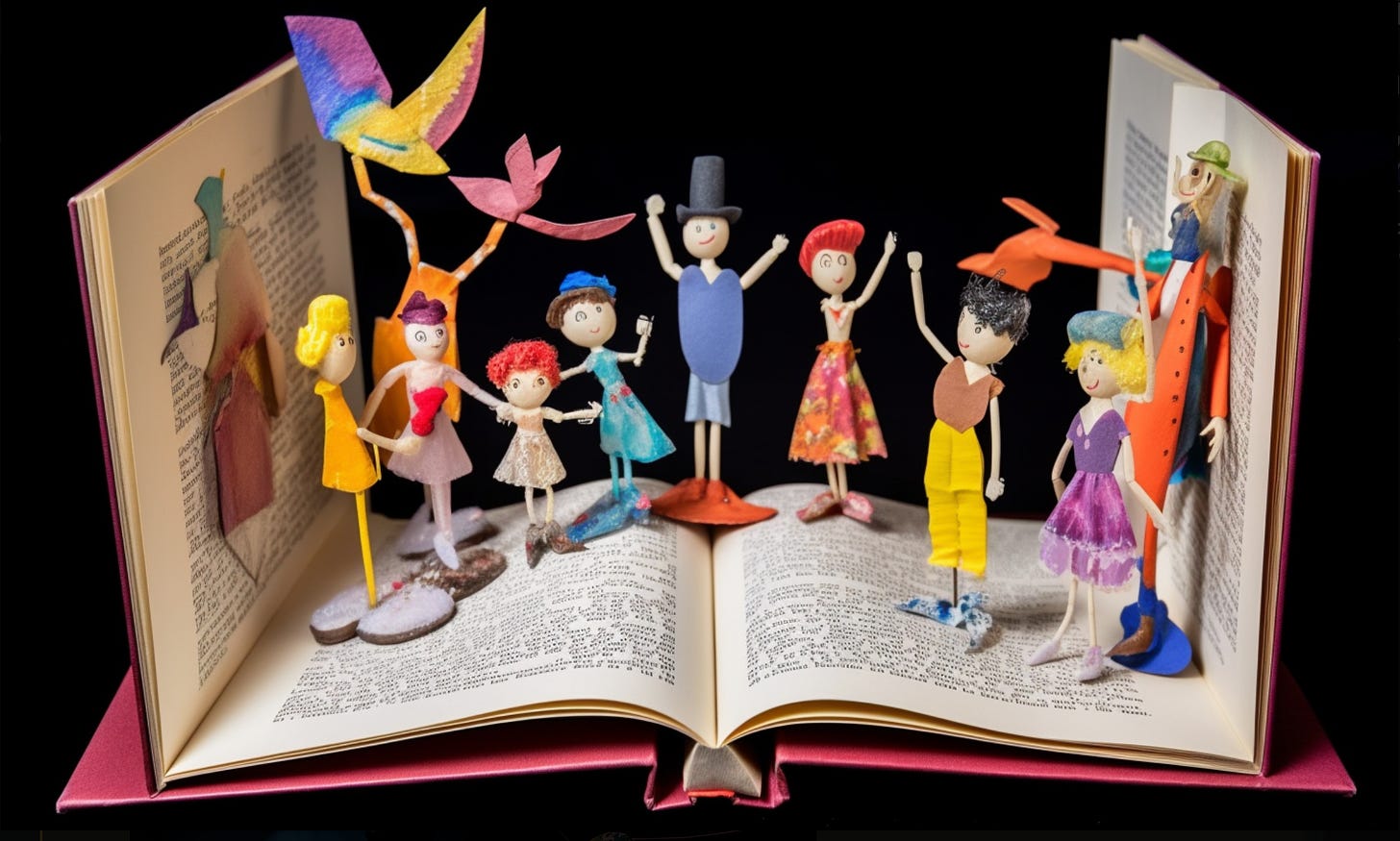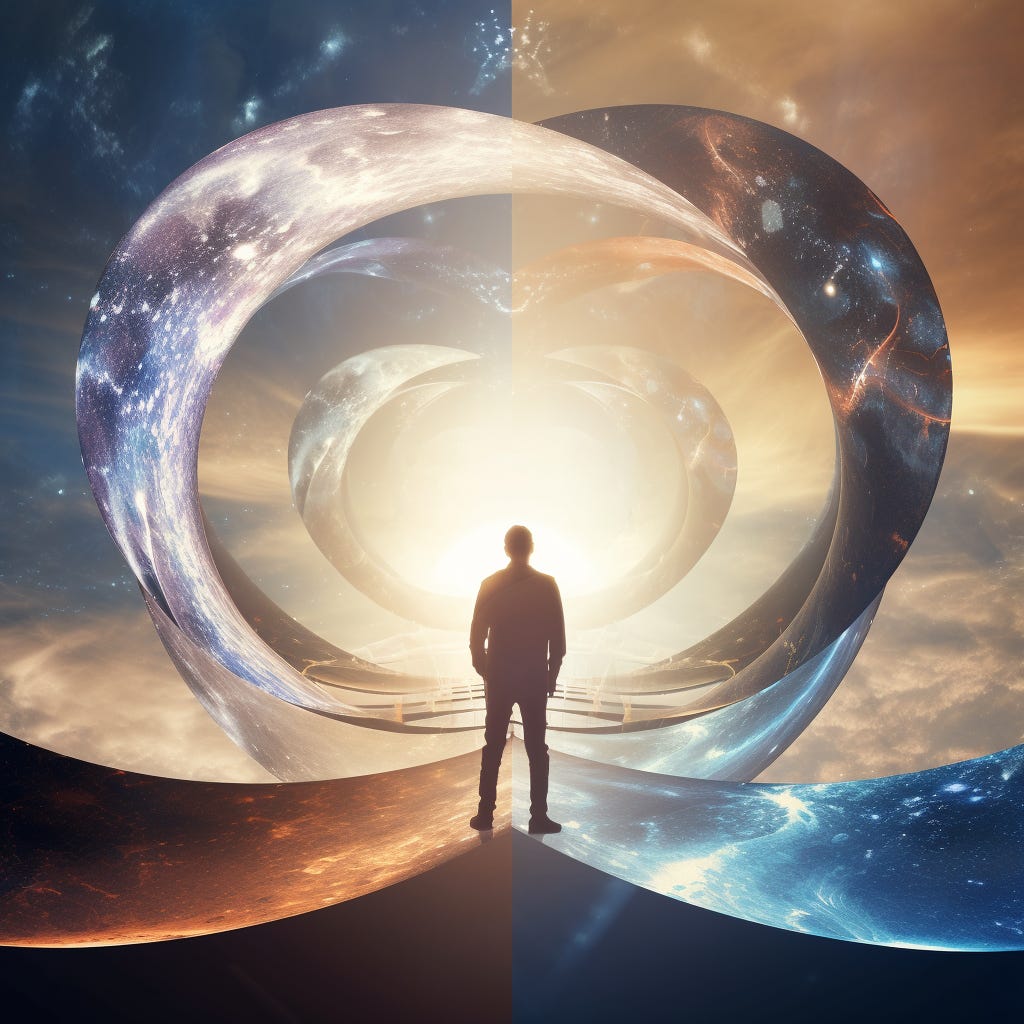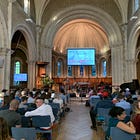Freewill and determinism in God's spoken world
Can the art of storytelling and the author-story analogy help us reimagine the relationship between freewill and predestination? An adventure in narrative theodicy!
Welcome back! I’m hoping to get more ‘Imaginative Discipleship’ podcast episodes out again soon, but today I’m exploring a more philosophical puzzle through the lens of storytelling and narrative.
Also, next week I’ll be off to the Hutchmoot UK conference celebrating faith, art and storytelling – if you’ll be there, let me know in the comments so I can make sure to say hello to you in-person! You can read my thoughts on last year’s Hutchmoot here:
Before I begin my article, I must tip my hat tip to N D Wilson for the phrase ‘God’s Spoken World’. His book Notes from a Tilt-A-Whirl: Wide-Eyed Wonder in God's Spoken World (Thomas Nelson, 2013) is one of the inspirations for this article, and includes chapters such as ‘The Problem of Evil and the Nonexistence of Shakespeare: A Paper by Hamlet, Prince of Denmark’. It’s a brilliantly creative book, but I want to lay out some related ideas in a slightly more straightforward manner.
Nate’s children’s book series, 100 Cupboards, Ashton Burials, and Outlaws of Time, are also all well worth checking out, and are both genuinely well-written and robustly Christian in their outlook and worldview.
Let’s dive in!
Freewill and determinism in God’s story…

Who’s responsible?
Who killed King Duncan – was it Macbeth or Shakespeare?
Is Gollum responsible for biting off Frodo’s finger, or was it all down to Tolkien?
Did George Lucas blow up Alderaan, or the Empire?
The answer to these questions is on one level both. Or better: it depends.
I believe this question can help us get to grips with one of the greatest puzzles and tensions in the Christian faith – that of God’s sovereignty and human freewill. It’s an tension where writers and artists, with their experience of storytelling and creativity, can help illumine a very philosophical and theological problem.
The problem of freedom
If God is all-knowing, all-powerful, the eternal creator and sustainer of everything that exists, what room is left for human freedom?
How can God not be responsible for all of the evil and suffering we see in the world?
This question becomes particularly sharp when coupled with the doctrine of predestination. There are various passages in the Bible where it seems to indicate that God chose who he would save, such as:
“For he chose us in him before the creation of the world to be holy and blameless in his sight. In love, he predestined us for adoption to sonship through Jesus Christ, in accordance with his pleasure and will.”
– Ephesians 1:4-5 (NIV)
“For those God foreknew he also predestined to be conformed to the image of his Son, that he might be the firstborn among many brothers and sisters. And those he predestined, he also called; those he called, he also justified; those he justified, he also glorified.”
– Romans 8:29-30 (NIV)
How is it fair if God created some people knowing that he would damn them to Hell, while picking out just a few to be saved?
Are we any more God’s puppets, bound for Heaven or Hell with no choice on our part?
These are big questions and go to the heart of the coherence and goodness of the Christian story. The debate is usually framed as being either/or.
Either we have libertarian free-will (and so God’s power is either voluntarily or necessarily limited)
Or God determines everything (but our lack of freewill is somehow compatible with human responsibility, according to those who take this view).
I’ve grown up in the Reformed, Calvinist tradition, which emphasises the sovereignty of God (his complete control over everything that happens) and the grace of God (salvation is completely a gift of God, not something that God gives us because of our own goodness or foreseen faith). The mainstream Calvinist position I’ve grown up with is compatibilism, that divine determinism and human responsibility are compatible.
But compatibilism is typically taken to mean that we have no spontaneity of choice. Compatibilism sees our choices as being ‘free’, or at least our own responsibility, only in the sense that we always follow our strongest desires. But these follow on inevitably from prior causes. If you rewound the clock, a person would always make the same choice given the exact same situation and prior circumstances – we don’t actually have the freedom to pick between alternatives. Our choices simply reveal what we were always going to do.
But what if it can be both/and? What if divine determinism isn’t just compatible with human responsibility, but also with human freewill?
What if, within God’s plan and story, we actually have agency to make choices, to be our own causes, not determined by prior cause and effect? Might it be coherent to be, as it were, a ‘Freewill Calvinist’?
Inside and outside the story
Let’s return to an example from fiction. Who killed Harry Potter’s parents, Voldemort or J K Rowling? Did Voldemort choose to kill James and Lily, or was his action fixed outside his control?
It depends: Are you talking about inside the story in the world of the characters, or outside the story in the world of the artist?
Outside the story, J K Rowling determined everything that happened in her story-world. (Of course, there are details that are left indeterminate in the text that leave room for fans or for the author herself to offer subsequent interpretations).
Inside the story, her characters make choices and bear the responsibility for their actions (except for when they are under an Imperio curse or otherwise being coerced).
I believe this author/character relationship is a powerful analogy for the relationship between Creator and creation, God and human freedom. God’s sovereignty and human freedom are both/and, both being true depending on whether you take an ‘outside’ or ‘inside’ perspective.

Characters in God’s story
I believe we are characters in God’s story. He is speaking the story of the world. The universe is his spoken-world work of art. God’s creative act doesn’t just set the world going, but sustains it moment-by-moment. As he tells the story, God freely chooses what our free-will choices will be. From ‘outside’ the story, it is completely up to God what happens.
‘Inside’ the story, however, our choices aren’t determined by what’s gone before, by a mechanical chain of cause-and-effect. Humans are free agents, able to redirect the story one way or another, to be original, to decide between contrary possibilities. We are capable of ‘agent causation’, of being sources of fresh creative direction. Our choices are bounded by our capabilities and dispositions, but within our limits we have a genuine range of action open to us. Our choices shape our character: each time we choose one way, we change the part of us that chooses, we shape our character, making it easier to act in the same way in future, whether for better or worse.
I believe God’s authorship does not cancel out our freedom as characters. His act of creation is what gives us freedom to make real choices within the realm of the story. If the narrator is silent, their story simply ceases. If God stopped telling the story, it wouldn’t continue freely on by itself.
You might object, naturally enough, that we are more real than characters in a story, whose freedom is purely fictional. But even as human authors, we sometimes find our characters often taking on a life of their own. You might have a plan for the plot, but they surprise you as you realise that they would in fact do something quite different, even though it is still the author doing the writing. If this ‘life of their own’ is true even for our creations, how much more so for God and the people that he makes?
If we are ‘more real’ than characters in a story, so too is God is ‘more real’ than a human author. If our being and freedom as human creators are in 3D compared to the being and freedom of the characters in our stories being in 2D, then God is on a higher dimension still, 4D (or more!) to our 3D existence.
God is on the upper side of the Creator-creature distinction. By analogy, the author-story distinction gives us some clue about how his power and our freedom can operate together, on different complementary levels.
Or to switch to a musical metaphor, God’s freedom as creator and our freedom as creatures are two notes that sound together in harmony, rather than two propositions that contradict each other. In The Silmarillion, Tolkien uses this idea of disharmony and harmony in a wonderfully vivid way to explore the question of evil. As Ally Gordon summarises it in his book Why Art Matters:
We might find a good analogy for Christ’s redemptive beauty in the work of Tolkien. In The Silmarillion, he tells the epic creation myth of Middle-earth. The creator is Ilúvatar, an all-powerful deity who teaches the Ainur, immortal spiritual beings like angels or demi-gods, to sing and make music and participate in his song of creation. It’s a rather wonderful picture of art and music as a catalyst for physical creation. But the most powerful of the Ainur, Melkor, attempts to disrupt the music of the Ainur by making his own theme, ugly and discordant, introducing disharmony into creation. His action might be read as an image of the fall and of sin.
Yet what happens next is surprising. We might expect the Ilúvatar to cancel out Melkor’s disruptive music, to press rewind and start again. Yet he allows the discordant melody to play out and into creation. Even more, he interweaves the discordant melody into the music of creation to allow a tension between harmony and corruption. Ilúvatar creates a new theme more sorrowful yet also more beautiful than before. Where first we think Melkor has ruined creation for everyone, we later see that Ilúvatar uses his disobedience to bring order from chaos, and deeper beauty into the story of the world.
I don’t believe Tolkien intended the song of Melkor to be an exact analogy for the problem of evil. But it serves as a powerful image of how God allows the corruption of good things, whilst also bringing beauty from the brokenness, good out of evil. We might hear this in a poem that shines light into our darker moments, in a song that laments with great sorrow or a beautiful painting that reminds us in hope that death is not the end.
What’s perhaps slightly different in Tolkien’s creation myth from the author-story analogy is that Ilúvatar isn’t explicitly ultimately the author of the whole song from an ‘outside’ perspective: the song of the Ainur that creates the world is a co-creation between ‘God’ and his ‘angels’, within the mythology of the elves. But it still provides a memorable image that illumines why God may allow evil within the song of the story of the world, while taking it up and transforming it for his greater purposes.
Authorship and divine moral responsibility
The author-story analogy also helps us look at God’s moral responsibility for evil differently.
We don’t judge an author as evil for having characters who do evil in their story. What matters is the viewpoint that the author brings to events, the judgment that they make on the characters.
Often that viewpoint becomes clearest in the ending that the author gives to the characters. In fairy-stories, the wicked get what they deserve, and the good get rewarded beyond what they deserve, because that’s how we want to tell children the world ought to be.
In the Harry Potter books, the sacrificial death of Harry’s mother saves him from Voldemort. The darkness of his evil lets the light of self-sacrifice shine out. That’s a theme that resonates throughout all seven books. Harry himself makes mistakes, but he grows and learns through them, eventually offering up his own life to save his friends - and in doing so willingly, escapes death and defeats evil. (Sound familiar?)
Nate Wilson put it this way in Notes from a Tilt-a-Whirl (p. 17):
This world is beautiful but badly broken. St. Paul said that it groans, but I love it even in its groaning. I love this round stage where we act out the tragedies and the comedies of history. I love it with all of its villains and petty liars and self- righteous pompers. I love the ants and the laughter of wide-eyed children encountering their first butterfly. I love it as it is, because it is a story, and it isn’t stuck in one place. It is full of conflict and darkness like every good story. And like every good story, there will be an ending. I love the world as it is, because I love what it will be.
If the world is a story, then the goodness of its creator depends on something deeper than the presence of evil within the story. Just as a story without conflict is a lesser story, a world without the freedom to choose between good and evil would be a lesser world. God is working all things for good, and our freedom is worthwhile for the greater story, and for the courage, goodness, sacrifice and so on that can only be realised in the struggle between good and evil.
We are in the middle of the story, but the story is one of redemption, of all things made new in Christ. The happy ending is coming; everything sad will indeed come untrue, like Sam wondered in The Lord of the Rings.
The author entering the story
It gets more complicated: the miracle of the Incarnation is that the Author entered his story. Jesus is God become a character in his own story. Jesus allowed himself to be killed by his characters, in order to save us.
Human freewill, though real and important, doesn’t ‘contribute’ anything to our salvation. Jesus saves us, and it’s all down to his grace, his unmerited kindness to us. Often when the Protestant Reformers were objecting to ‘freewill’, they were doing so in favour of grace rather than in favour of determinism. They insisted on our inability specifically to choose God freely due to our bondage to sin. They weren’t necessarily denying our ability to make genuine free choices in a general sense.1
When it comes to being rescued from sin, we are utterly helpless within the story. By human freewill, we had lost the freedom to love God faithfully; we were dead in our sins. And it took the miracle of God entering the story to raise us to new spiritual life to rescue us. We aren’t saved because God foresees that we will choose him, but purely as a gracious gift, from God both as Author ‘outside’ the story, and as the Saviour ‘within’ the story. But when God gives us new life, it is our freewill that responds – and in being saved, we are made more fully free again. We are made capable of faith and love that were outside the reach of our freewill while we were dead in sin.
There’s lots more to unpack here, and lots more historically, philosophical and theologically that lurks below the surface.2 But I hope this introductory sketch is helpful!
The world is a story. God is both author and rescuer.
What do you choose? Do you choose to join in God’s story of redemption?
And what do you think of the author-story analogy for God and the world? Can it be both/and between God’s determining and our freedom? If not, where do you think the analogy breaks down, and which side of the debate do you then fall on?
Let me know in the comments or join the chat!
See A Few Thoughts on Calvinism on my blog for why I don’t think Calvin believed our choices were deterministic ‘within’ the story. It’s worth also checking out the Westminster Confession of Faith 5.1 and 5.2 and looking at how it balances infallible providence and freedom of second causes.
For more in-depth background, see:
Willem J. van Asselt, J. Martin Bac, and Roelf T. de Velde, eds., Reformed Thought on Freedom: The Concept of Free Choice in Early Modern Reformed Theology (Grand Rapids: Baker Academic, 2010)
Oliver D. Crisp, Deviant Calvinism: Broadening Reformed Theology (Minneapolis: Fortress, 2014), chapter 3 (“Libertarian Calvinism”)
Richard A. Muller Providence, Freedom, and the Will in Early Modern Reformed Theology (Reformation Heritage Books, 2022).






Love this, Caleb! I'll be hand-carrying my copy of Notes from the Tilt-a-Whirl to HMUK. It's my favorite nonfiction book!
The free will debate is resolved by realising that we are in a relationship with God.